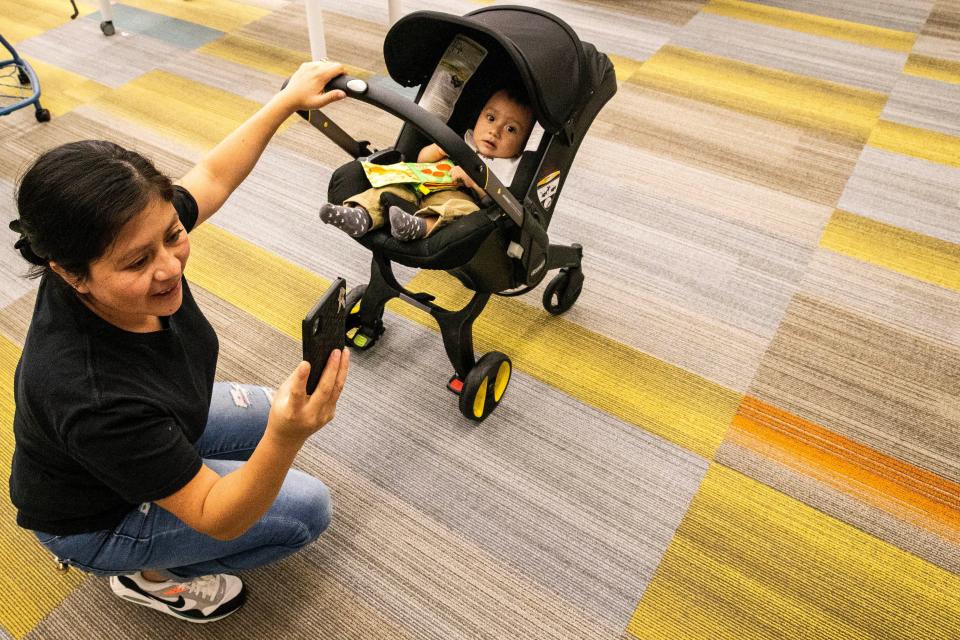Breaking down education funding in Delaware's proposed 2025 budget
- Oops!Something went wrong.Please try again later.
The governor is looking to infuse more money into Delaware schools.
On Jan. 25, Gov. John Carney laid out a roughly $6 billion operating budget for fiscal year 2025. He cautioned the state can expect negative revenues in both 2024 and 2025, but for now, taxes are remaining flat.
The spending plan marks $2.1 billion to K-12 public education, including funds to increase educators’ salaries, expand access to subsidized child care and early childhood education and other initiatives. It also dedicates an additional $10 million in opportunity funding to support low-income and English learner students.
"Our recommended budget continues to responsibly invest in areas I’ve prioritized during my time as governor — in public schools, our economy, our workforce and protecting our environment — while making sure these investments are sustainable in the long run,” Gov. Carney said last week.
This also includes investments in higher education, some $30 million to state schools for deferred maintenance, capital improvements and technology upgrades, and an $8 million increase in scholarship funding.
Next, it's up to the Delaware General Assembly to figure out the spending. In the coming weeks, universities and other state agencies will meet before the Joint Finance Committee to share proposals and ask for more funding.
"Candidly," said Paul Herdman, Rodel of Delaware president and CEO, of the education earmarks, "it's a strong investment in a tight year."
Big Picture: The 5 takeaways from Delaware Gov. John Carney's 2025 budget address
Bumping their bottom lines

Delaware continues to march toward a $60,000 starting salary for new teachers.
The figure is now in the state's sights by likely fiscal year 2028. Aligned with the first phase of October 2023 recommendations from the Public Education Compensation Committee, funding announced last week stands to provide a 1% salary bump to paraprofessionals on top of a 2% bump for state workers across the board.
Delaware's largest teachers union is paying attention.
"We were very happy to see that the governor included the first year of the PECC recommendations in his budget," said spokeswoman Shelley Meadowcroft of the Delaware State Education Association. "That's a huge step forward for the state."
Meadowcroft said her team is looking forward to continued discussions on education support professional pay scales in particular — paraprofessionals, bus drivers, meal providers, many more also included in PECC recommendations — aiming to push those further in the year ahead.
"But we were very happy to see that this first step was fully included in the budget and appreciate the governor and all that he's done with educator pay over the last four years," she added. This follows last year's spending plan, wherein Carney pushed basically a 9% pay increase for Delaware teachers, alongside increases for other state employees.
This year's budget includes funding for across-the-board cost of living increases for state workers, too, an average annual salary that has increased 31% since 2017. Those salary bumps are key, Sen. Trey Paradee told Delaware Online/The News Journal.
“We still have a lot of vacancies in some really key areas and key agencies that we need to fill. ... So in order to maintain services, we’re going to have to continue to increase state employee pay so we can be more competitive and be able to retain employees," Paradee, D-Dover, said.
Looking back: Where is Delaware State one year after calls for improved safety, handling of sexual assault?
Housing: Delaware home sales sank in December as prices rose. National expert predicts better 2024
Another swell to opportunity funding

The shape of school funding in Delaware has been a hot topic lately.
In December, a long-awaited independent assessment of Delaware's education funding system dropped — recommending some sizable changes. It marked the latest development following a 2020 settlement after Delawareans for Educational Opportunity and the NAACP sued the state in 2018 for being aware of deficiencies in resources provided to lower-income students, students with disabilities and multilingual learners.
Many eyes remain fixed on how the state could proceed with recommendations to create a formula based on student needs, not resource-based units. In such a system, money would follow students with these higher needs.
Deeper: New report calls on Delaware to spend more, update school funding to follow students
Right now, opportunity funding — also a product of the 2018 lawsuit — is based on the same idea. And Carney's additional investment of $10 million brings Delaware ahead of schedule, surpassing the 2025 goal of $60 million overall, as more money heads to districts and schools with high-need scholars.
"It's moving in the right direction, particularly since it's focusing on students who need more support," said Paul Herdman, Rodel's president and CEO. "But I think it still requires us to think bigger, about some systemic changes."
Increasing access to subsidized child care

Carney also pointed at early learning in particular.
"Our plan makes significant investments in early childhood education to create more seats for the children and families who need them the most," the governor said, outlining a proposed $135 million investment into early childhood care.
This would mark more than doubled investments in both Purchase of Care and Early Childhood Assistance Program since 2017 figures, according to Carney's office.
Purchase of Care, with $83 million dog-eared for the child-care subsidy, would see family eligibility expanded to 200% of the federal poverty level, up from 185%. According to the state, this would expand access to subsidized care to over 600 more children.
A $3.5 million increase for Delaware's Early Childhood Assistance Program would add at least 200 seats for early care and education of infants, toddlers, 3-year-olds and 4-year-olds, according to the Office of the Governor.
Too many kids, not enough child care: Delaware families facing job woes amid shortages
Delaware families continue to face strained supply and high costs for child care, according to late-2023 survey results released by a coalition of partners, including the Rodel Foundation. Half of the respondents said child care costs more than their groceries. About 43% said it costs more than their car payments; for 49%, more than utilities.
“We are seeing more and more families who are unable to enroll their children in child care centers because of the cost,” said Karen Hartz, director of early childhood services for the Latin American Community Center in Wilmington, back in November. “They no longer qualify for child care assistance through the state, but paying for child care out of their salary does not make economic sense."
Herdman called early childhood one of the strongest investments to make if the state is discussing student success in Delaware overall, noting "the importance of investing early." His foundation has been dialed in on this issue.
"Given it's a tight year, very much appreciate the governor prioritizing early childhood," he said. "But there's room to grow."
Delaware lawmakers, particularly the Joint Finance Committee, may tweak or build on the governor's spending plan in weeks to come. The General Assembly has to pass the budget by June 30.
Got a story? Kelly Powers covers race, culture and equity for Delaware Online and USA TODAY Network Northeast, with a focus on education. Contact her at kepowers@gannett.com or (231) 622-2191, and follow her on Twitter @kpowers01.
This article originally appeared on Delaware News Journal: Gov. Carney's 2025 budget proposes some boosts to education funding

